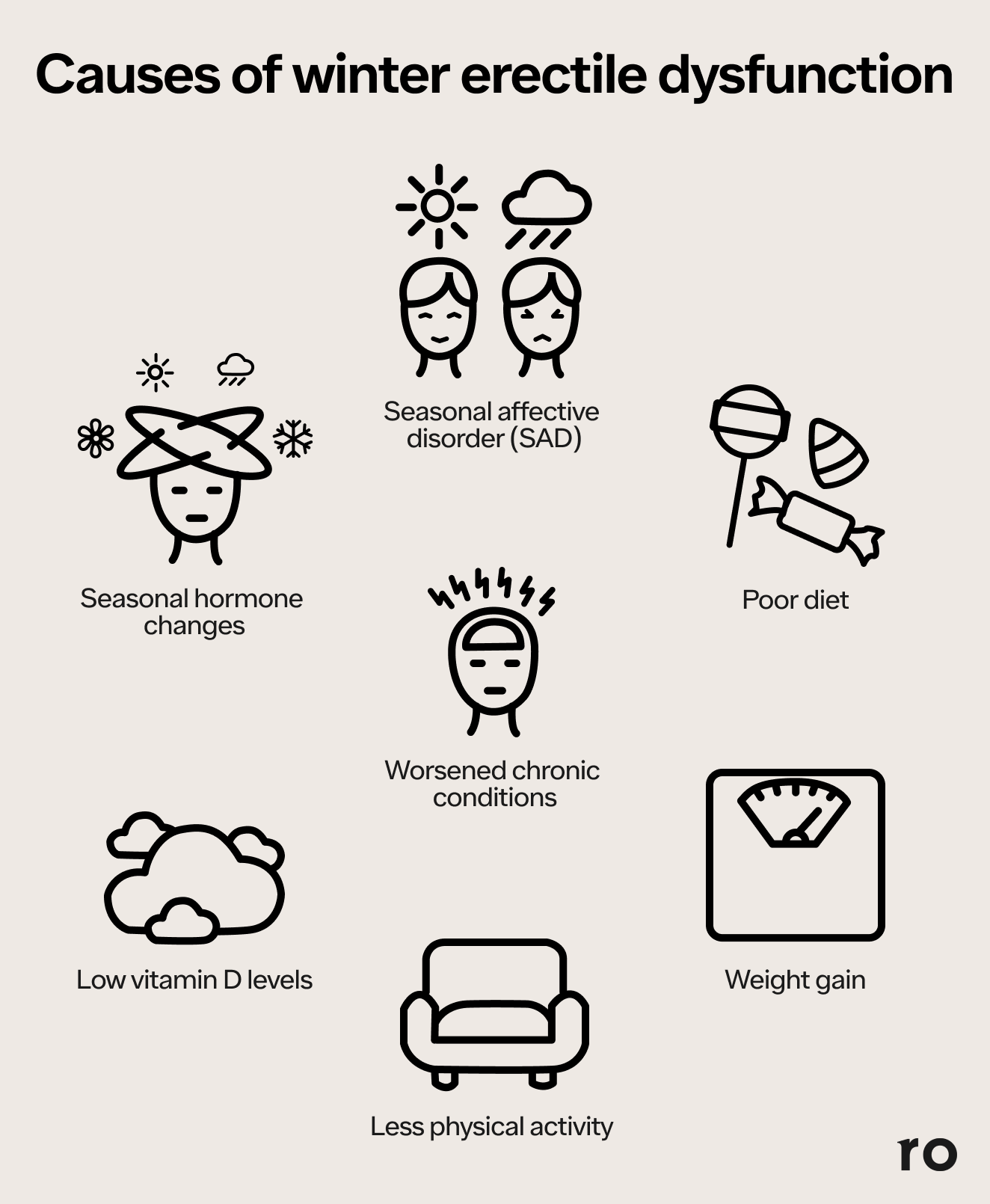
This story was produced by Ro and reviewed and distributed by Stacker.
Can winter cause erectile dysfunction?
Winter can be a bit of a downer. If you live somewhere that gets cold, with little sunshine and lots of snow, you likely know this all too well. And if you find yourself dealing with erectile dysfunction, or ED, in winter—but not necessarily at other times of year—you might be wondering if the season can be a downer for your penis, too.
Honestly, it can. There are several reasons why you might be more likely to experience ED in the winter, including lifestyle changes (e.g. diet, physical activity), hormonal fluctuations, low vitamin D levels, and worsened chronic conditions. In some cases, multiple causes might be working together to keep you from performing sexually.
Below, Ro gets into why winter erectile dysfunction happens and what to do about it.
Key Takeaways
- "Winter erectile dysfunction" isn't a clinical diagnosis, but there are many reasons the season may be linked to higher rates of ED.
- Several seasonal factors may be to partially blame for winter ED, from hormonal shifts and low vitamin D levels to changes in lifestyle.
- The best course of action for dealing with "winter ED" is to see a healthcare provider who can determine the root cause and suggest treatment based on their findings.
Can Winter Cause Erectile Dysfunction?
If you were to ask a Magic 8 ball, the answer might be, "signs point to yes." It isn't certain that winter causes erectile dysfunction, but many things about the season are linked to increased ED.
Take one 2021 study, for example, in which researchers analyzed U.S. Google Trends data from 2009–2019 and found significantly more internet searches for ED during the winter than summer. This evidence doesn't explicitly confirm that the condition is more common in the winter. But it certainly suggests a seasonal variation in ED and implies an increase during winter, according to the researchers.
Another 2021 study analyzed data from a university hospital between 2010 and 2020 and found that more ED symptoms were diagnosed in the winter seasons.
Why Can Winter Cause or Worsen Erectile Dysfunction?
The etiology of ED is diverse and often complex. Causes can include psychological and physical facets, which are frequently interwoven with comorbidities such as diabetes, cardiovascular disease, and neurologic disorders.
How does winter fit in? Well, it can influence several different factors that all may play a role in contributing to ED. This list of potential reasons isn't exhaustive—and consulting a healthcare provider is your best bet for ID-ing the root cause of your issues—but it can give you an idea of why you might be dealing with erectile dysfunction, specifically in the winter.
Seasonal Hormone Changes
It's well-established that testosterone levels fluctuate throughout the day, but research also suggests they may vary seasonally, too. A 2022 study analyzed hormones among nearly 8,000 men aged 20–70 found that bioavailable testosterone levels peaked in the late summer and early fall (August-October) and declined thereafter, reaching their lowest point in March.
As you may already know, testosterone plays a vital role in sexual health. Low testosterone can negatively impact libido and contribute to a dip in energy and mood, which may all indirectly contribute to problems with sexual function.
Low Vitamin D Levels
If you live in an area that doesn't get much sun in the winter (or it's too cold to go outside and soak it up), you may be low in vitamin D. The nutrient is found in some fortified foods (e.g., milk, breakfast cereal), but most folks tend to get their fill from (safe) sun exposure. Though the evidence is mixed, some studies show a link between low vitamin D levels and ED.
There are several reasons why vitamin D might influence sexual function, including bolstering testosterone levels, maintaining endothelial tissue (the lining of your blood vessels), and supporting the production of nitric oxide (a molecule that facilitates blood vessel dilation). The latter two are key to maintaining the proper blood flow needed to fill the penis with blood and achieve an erection.
Vitamin D deficiency is also associated with atherosclerosis (plaque buildup) and hypertension (high blood pressure), both of which are linked to a higher prevalence of ED.

Seasonal Affective Disorder (SAD)
Seasonal affective disorder, often referred to as SAD, is a mood disorder characterized by depressive episodes that follow a seasonal pattern. It often impacts people during the winter, when daylight hours are shorter, though it's possible to experience SAD during other seasons, too. SAD is typically marked by symptoms such as sad mood, low energy, oversleeping, overeating, and weight gain. It can lead to more serious complications like social isolation, strained relationships, and worsened physical and mental health.
Though there aren't any studies looking directly at the relationship between SAD and ED, research shows a significant link between depression and ED. In addition to erectile issues, major depressive disorder is also connected to issues in other aspects of sexual functioning like libido, arousal, orgasm, and satisfaction.
If you take medication for seasonal (or year-round) depression, your medication could also be to blame for any winter erectile dysfunction. Antidepressants (particularly selective serotonin reuptake inhibitors or SSRIs) are just one type of medication that can cause ED. (That being said, always keep in mind to discuss all the medications you are taking with your healthcare provider to see if any of your medications might be a cause for your symptoms.)
Worsened Chronic Conditions
Interestingly, ED may have a seasonal component because it's significantly linked to several other diseases that peak during wintertime, including type 2 diabetes, coronary artery disease, or CAD , and hypertension. The seasonality of these associated health conditions may be the most powerful contributing factor to winter erectile dysfunction. In the aforementioned Google Trends study, the researchers posit that "the mechanisms underlying the seasonal patterns of ED are likely due to its associated comorbidities and risk factors."
Even if you don't suffer from one of these diseases, they could be on the horizon. Research shows that ED symptoms tend to precede other CAD symptoms by 2-3 years and a cardiovascular event (e.g. heart attack, stroke) by 3-5 years. Since ED can be the first symptom of an underlying vascular or heart disease, the American Urological Association recommends that people dealing with ED should recognize that this condition is linked to overall and heart health, so a more complete health check-up may be appropriate at the onset of ED.
Less Physical Activity
Seasonal shifts in your lifestyle can also contribute to increased ED symptoms in the winter. For one, there's a good chance you're less physically active in the winter (58% of U.S. adults are, according to a 2020 survey by the National Recreation and Park Association)—and that could be affecting your ability to have and maintain an erection.
Research shows that physical activity and exercise (especially cardio) are inversely associated with ED. One study from 2009 found that less active men had approximately 40% to 60% greater odds of ED compared to active men.
Staying active can both protect against ED and help improve symptoms if you are already experiencing it. Conversely, lack of movement and a more sedentary lifestyle can also increase your risk of the aforementioned chronic conditions, all of which are significantly associated with ED.
Poor Diet
Similarly, eating a more unhealthy diet can impact your sexual health and functioning. As for nutrition, research shows that a higher-quality diet—such as one that's rich in vegetables, fruits, nuts, legumes, and fish or other sources of healthy fats and lower in red and processed meat—is linked to a reduced risk of developing ED.
Many factors can impact food choices and diet quality from season to season (think: culture, location, holidays, etc.), but there's some evidence suggesting people tend to consume less produce and eat more calories during the winter than in the summer. If your winter diet tends to be a little more indulgent—perhaps a bit more full of ED-unfriendly foods (e.g. red meat, alcohol, processed items, high-sugar or high-sodium foods)—it's possible your eating habits could also play a role in your down-there difficulties.
Weight Gain
Put less physical activity and worse eating habits together, and you'll likely get weight gain, which is, unfortunately, not good for ED. Like CAD, diabetes, and hypertension, obesity is also closely linked to ED. A pound or two gained over the winter may not dramatically tip the scales, but if you gain a more significant amount of weight and edge closer toward developing obesity, it may have a more significant effect. The 2009 study mentioned earlier found that men with either a high waist circumference or an obese body mass index, BMI, (30 or above) had approximately 50% higher odds of having ED compared to men with a low waist circumference or a normal BMI (18.5–24.9).
How to Prevent or Treat Winter Erectile Dysfunction
The best treatment for winter erectile dysfunction will depend on the root cause.
ED (and especially winter erectile dysfunction) can often be traced back to conditions or factors affecting the health of your whole body. For that reason, the recommended initial treatment generally is to improve overall health status through lifestyle interventions: getting more physical activity, improving your diet, stopping smoking, drugs, and excessive alcohol, and controlling diabetes, blood pressure, and cholesterol. Similarly, if your healthcare provider believes the cause of your winter erectile dysfunction is psychological (for example, SAD), they may advise counseling with a qualified mental health professional.
Otherwise, the first line of treatment for ED tends to be phosphodiesterase-5 (PDE-5) inhibitors, a class of medications that work in part by relaxing blood vessels and increasing blood flow. They're effective for ED caused by a wide range of issues (including CAD, diabetes, and hypertension) and are shown to be highly effective, with an overall success rate of up to 76%.
Common PDE-5 inhibitors—all of which require an Rx from a healthcare provider and are oral pills—include:
- Viagra (sildenafil)
- Cialis (tadalafil)
- Vardenafil (formerly available as brand-name Levitra)
- Stendra (avanafil)
You can find some PDE-5 inhibitors in other forms as well, such as dissolvable tablets and gummies.
If PDE-5 inhibitors aren't a fit for you, your healthcare provider might discuss other treatment options, such as penile injections and external vacuum devices.
Viagra Important Safety Information: Read more about serious warnings and safety info.
Cialis Important Safety Information: Read more about serious warnings and safety info.
Bottom Line: Winter Erectile Dysfunction
ED is a common condition affecting about 40% of men by age 40 and 70% of men by age 70. Though we don't (yet) have rock-hard (pun intended) evidence confirming it's true, ED may vary seasonally, with symptoms appearing to become more prevalent in the wintertime. If you think you're dealing with seasonal sexual difficulties, here are the need-to-know basics:
- Winter erectile dysfunction could be caused by a variety of factors, including seasonal hormonal fluctuations, low vitamin D levels, seasonal depression, or lifestyle changes like reduced physical activity, worse eating habits, or weight gain. Many of these potential culprits are also linked to the most powerful predictors of ED: chronic health conditions, including heart disease, hypertension, and diabetes.
- If you're dealing with winter erectile dysfunction, step one is to see a healthcare provider. They can help determine the root cause and then prescribe the most appropriate treatment. Lifestyle changes are typically the first line of defense, followed closely by PDE-5 inhibitors, a class of medication that includes Viagra (sildenafil) and Cialis (tadalafil).
- If your ED only shows up when the temps cool down, you may be tempted to just ignore it and wait until spring blossoms—don't. Since ED can be an early warning sign of CAD and other health conditions, it's a good idea to get your health checked out regardless. It could just be the winter blues, but you're better safe than sorry.



